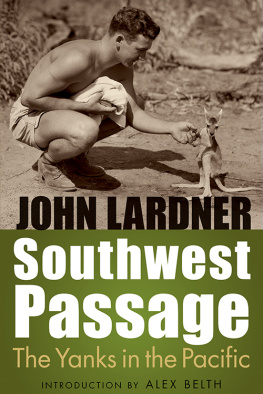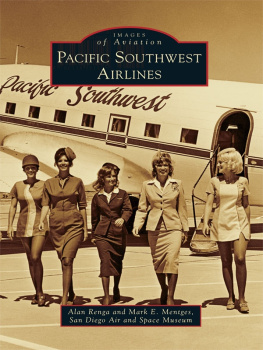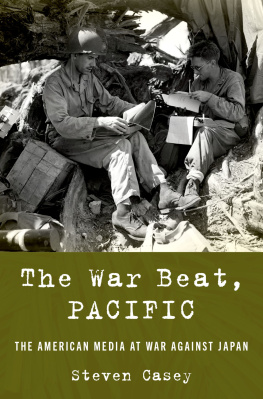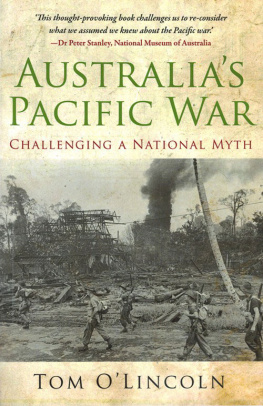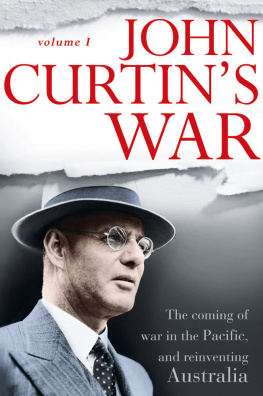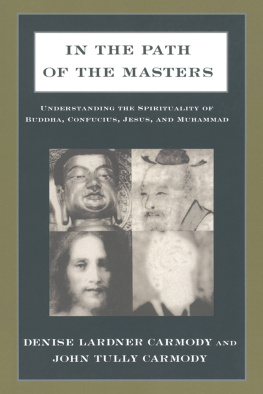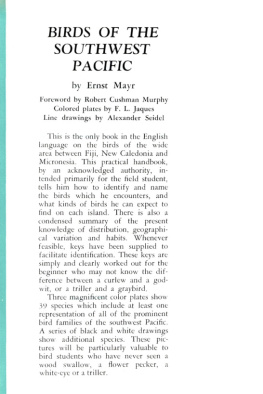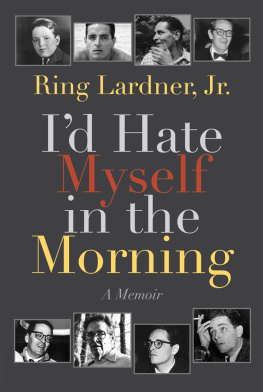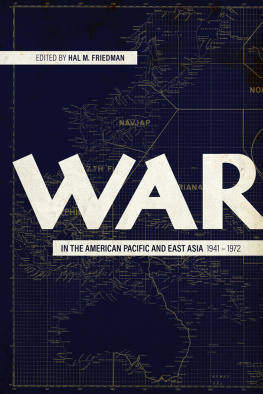JOHN LARDNER
Southwest Passage
THE YANKS IN THE PACIFIC
Introduction by Alex Belth
UNIVERSITY OF NEBRASKA PRESS
LINCOLN AND LONDON
1943 by John Lardner
Introduction 2013 by the Board of Regents of the University of Nebraska
All rights reserved
ISBN: 978-0-8032-4098-8
Library of Congress Control Number: 2013935261
Contents
Introduction
ALEX BELTH
When he went off to cover the war in the Pacific in January 1943, John Lardner was twenty-nine years old and, thanks to his weekly column in Newsweek, already a major figure in sportswriting. Nothing at Madison Square Garden or Yankee Stadium, however, could match the lure of what awaited him overseas. The war was everything, he said. I was glad to be in it, speeding along with it.
Lardners first stops were Australia and New Guinea, and what he wrote there became the backbone of the book you hold in your hands, Southwest Passage: The Yanks in the Pacific. Originally published seventy years ago, this was a buried treasure in Lardners considerable body of work as a reporter during World War II. Its blessed with Lardners unmistakable humor, and it captures the immediacy of what was then, to Americans, a new theater of war.
There was more to be seen, heard, and felt in this war, of course, than the fighting of it, he wrote. It took Americans to a strange world, with a strange flavor, and gave many of them a long time to look around between bullets.
Lardner crisscrossed Australia for four months, piling up ten thousand miles as he filed dispatches for the North American Newspaper Alliance and Newsweek. A lesser writer may have sought to dramatize what he saw, but Lardner pared away the extraneous with impeccable reporting. In the opening chapter, Lardner writes, I want to tell the story with as few profundities and earth-shaking conclusions as possible. Its this unpretentious approach to reportage that keeps Southwest Passage fresh for us today.
Shortly after he arrived, Lardner observed an American soldier opening diplomatic relations with an Australian in a bar in Sydney.
Well, boy, said the American, you can relax now. Were here to save you.
Ow is that? I thought you were a fugitive from Pearl Harbor.
About the locals, he wrote: There can hardly be people in the world more fiercely and fanatically independent than Australians. The notion that the Yanks had come to save Australiawell, some of us had it, sure enough, and there was no quicker way of tasting the quick mettle and genial scorn of the fellow we came to save.
No wonder Orville Prescott of the New York Times called Southwest Passage as personal, informal and chatty a book of war correspondence as has yet come along. Mr. Lardner has the happy faculty of taking the war seriously without taking himself seriously.
Lardners equanimity came naturally. He was, after all, the son of Ring Lardner, who was Americas most famous sportswriter before he became its most famous literary wit. Like his father, the son was serious about writing. As he said in a letter home: It seems pretty plain that the best thing to do during the war is to work hard at whatever work you have to do, wherever it may be. Working is the only way Ive ever found of being happy in a bad time.
Lardner had been witness to the pitfalls of being labeled a sportswriter. His father never fully escaped being typecast as just a sportswriter. But John wasnt just a sportswriter; he was one of the best. His reputation was cemented when he began a True magazine piece about a hell-bent prizefighter with these words: Stanley Ketchel was twenty-four when he was fatally shot in the back by the common-law husband of the lady who was cooking his breakfast. Lardners fellow sportswriting legend Red Smith called it the greatest novel ever written in one sentence.
Like his contemporaries W. C. Heinz and A.J. Liebling, Lardner was a war correspondent, and if he didnt enjoy their longevity or the lasting renown of Smith or Jimmy Cannon, he was every bit their equal. Heinz, in fact, is on record as calling Lardner the best.
Time has a way of dimming the memory and achievements of writers who wrote, essentially, for the moment, as writers writing for journals must do, Ira Berkow, a longtime columnist of the New York Times, told me. But the best shouldnt be lost in the haze of history and John Lardner was a brilliant writerwhich means, in my view, that he was insightful, irreverent, wry and a master of English prose.
John was born in 1912, the first of Ring and Ellis Lardners four boys. Their father was a study in reserve, a poker-faced observer of human folly who ushered his sons into the family business, although not by design. When his third son, Ring Jr., sold his first magazine piece, the father said, Good God, isnt any one of you going to turn out to be anything but a writer?
The Lardners moved to the East Coast from Chicago in the fall of 1919. Early on, they lived in Great Neck, Long Island, the model for the fictional West Egg in F. Scott Fitzgeralds The Great Gatsby (for a time, Fitzgerald was one of Rings closest friends). Another friend was Grantland Rice, who succeeded Lardner as the most celebrated sportswriter in the country. Whenever Ring took his sons to Yankee Stadium, Babe Ruth and Lou Gehrig always came by to pay their respects.
In his memoir, The Lardners: My Family Remembered, Ring Jr. wrote about the striking similarities he and his brothers shared with their father: Intellectual curiosity with a distinctly verbal orientation, taciturnity, a lack of emotional display, an appreciation of the ridiculous. It was a matter of course that you mastered the fundamentals of reading and writing at the age of four, and by six reading books was practically a full-time occupation.
John was all of ten when he broke into print with this ditty for the New York World:
Babe Ruth and old Jack Dempsey,
Both sultans of the swat
One hits where other people are,
The other where theyre not.
Ring Jr. claimed that John, more than any of his brothers, patterned his life on his fathers. John was bright and restless, and perhaps he pushed himself because he didnt want to be known only as Rings son. He wasnt given to talking about his motivations, but it is no stretch to assume that his fathers considerable talent gave him something to shoot for.
John grew up in the shadow of a father who was a great writer, Liebling wrote. This is a handicap shared by only an infinitesimal portion of any given generation, but it did not intimidate him.
As for himself, John wrote, In the interests of learning to read and cipher, I made the rounds at a number of schools, my tour culminating in Phillips Academy, Andover, and Harvard University (one year), where I picked up the word culminating.
He went to Paris for another year to study at the Sorbonne, worked for a few months in Paris on the International Herald Tribune, then returned to New York in 1931 and landed a job with the New York Herald Tribune. He covered local news and quickly earned bylinesno small achievement at what was considered the citys best-written paper. We are all swollen up like my ankles, his father boasted.
At twenty-one, John left the Herald Tribune to write a column for the North American Newspaper Alliance. It was the Depression, and he was pulling down an impressive $100 a week, but his father would not live long enough to see him cash any paychecks. Ring died in 1933 after suffering for years from tuberculosis and alcoholism. He was forty-eight.
In the late 30s, John began his transition to magazine writing. He published a story for the Saturday Evening Post
Next page
